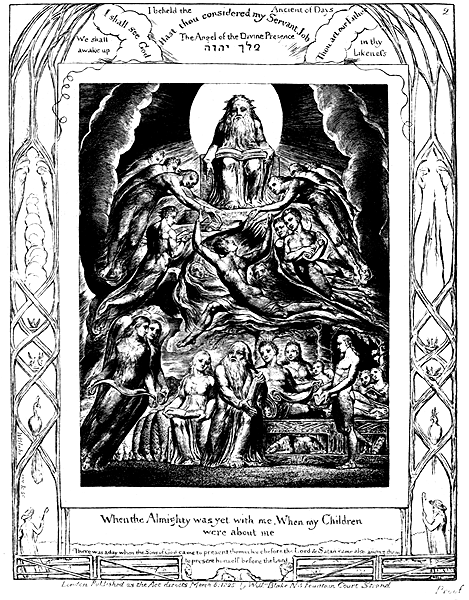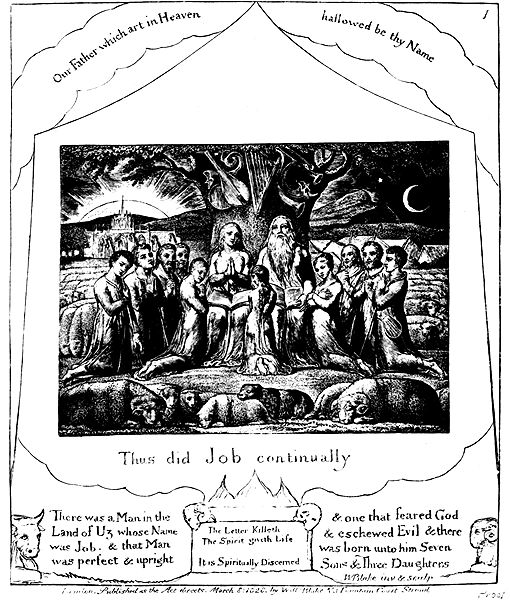Blake's mind was infinitely expansible-- and contractable, as in Plate 55 of Jerusalem (E205):
"Let the Human Organs be kept in their perfect Integrity
At will Contracting into Worms, or Expanding into Gods
.........
"Such are these Ulro Visions, for tho we sit down within
The plowed furrow, listning to the weeping clods till we
Contract or Expand Space at will: or if we raise ourselves
Upon the chariots of the morning. Contracting or Expanding Time!
Every one knows, we are One Family! One Man blessed for ever"
(But the Heavenly Visions know nothing of time or space; those are artifacts of the World.)
"Damn braces Bless relaxes." (MHH plate 9; Erdman 37)
In MHH Blake's Energy and Creativity ran away with him; he despised restraints: turn out all the stops; put the volume pedal on the floor. MHH is shocking in the Nth degree, frightening! All his life his problem was self-control (the last of the Gifts of the Spirit). He had no desire for Self-control.
Lucky for Blake he had a wife, a good and faithful wife: indulgent, but she had a limit. (If Nietzsche and Van Gogh had achieved a successful marriage, they might have flamed out so early.
So as we see Blake had a Urizen within. Urizen believed in Control; he gave the Law, and Blake fought him. He also had a Luvah within. Blake fought the first battle with the struggle between Urizen and Luvah; it was a power struggle between the two inner 'gods', and eventually they made a deal: Urizen, the Light Bearer, gave the Sun to Luvah (Luvah took over the South, while Urizen moved to the North (For a while Blake seemed free from the Law and gave himself up to Feeling).
"When man lives by Urizen's 'beast-formed science' he is in nonexistence. The change from nonexistence to existence - the change from Satan to Christ" (Percival page 231))
It was a fragile arrangement; Luvah, like Icarus, got too close to the Sun and crashed. Meanwhile Urizen continued his (false) Creation. He went from bad to worse. In his rocky creation he look ahead; Futurity terrified him, took all his ego and left him a quivering failure. Los came in and subdued him (which seems to represent Blake's Imagination getting the best of his fears).
Once Los had won the battle he found his hatred of Urizen melting away; he found he loved him; he rehabilitated him, so that Urizen was now able to recognize and accept a New Lord.
In Jerusalem 98 Blake told of the final reconciliation of Urizen, Luvah, Urthona, and Tharmas. It is the Apocalypse, the End of Eternal Death leading to Eternal Life, when we graduate from Mortal Life, all is United into the One Man (as in John 17:21).
It was a fragile arrangement; Luvah, like Icarus, got too close to the Sun and crashed. Meanwhile Urizen continued his (false) Creation. He went from bad to worse. In his rocky creation he look ahead; Futurity terrified him, took all his ego and left him a quivering failure. Los came in and subdued him (which seems to represent Blake's Imagination getting the best of his fears).
Once Los had won the battle he found his hatred of Urizen melting away; he found he loved him; he rehabilitated him, so that Urizen was now able to recognize and accept a New Lord.
In Jerusalem 98 Blake told of the final reconciliation of Urizen, Luvah, Urthona, and Tharmas. It is the Apocalypse, the End of Eternal Death leading to Eternal Life, when we graduate from Mortal Life, all is United into the One Man (as in John 17:21).


